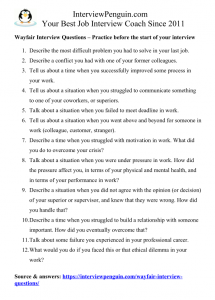Wayfair is well-known for sophisticated interview processes, consisting of few rounds. Behavioral and situational questions prevail, regardless of whether you try to get a job of a Warehouse Associate, PR Manager, Customer Service worker, or Software Engineer.
In the case of IT jobs, you will have to pass an online test of your coding skills (which can also consist in several rounds). Wayfair cooperates with different online platforms for such testing, and the problems you will solve in the test depend on the exact IT job you want to get with Wayfair.
Needless to say, you can hardly prepare for such a test in advance. Either you know your field or you don’t. But you can prepare for the behavioral (situational, STAR) questions, and we will focus on them in this article. Let’s start!
Table of Contents
Describe the most difficult problem you had to solve in your last job.
Try to talk about a problem that is at least somehow relevant for the new role you try to get with Wayfair. If you apply for an IT job, talk about a difficult coding puzzle you had to solve, or a tricky software issue you had to address in a short time.
If you apply for customer service position, you can talk about facing some ethical issue, or dealing with a troublesome customer, or anything else. In a warehouse job you may refer to a problem with stock organization, or having to replace a colleague on a shift, or trying to meet some unrealistic demand for expedition time, etc.
You should talk either about a problem that you successfully solved (and give credit to people who helped you solve the problem), or one which you failed to solve, but learned an important lesson while trying to solve it.
Describe a conflict you had with one of your former colleagues.
In almost every Wayfair interview they will ask about a conflict situation you experienced in one of your former jobs. This can include conflicts with colleagues, superiors, customers, or even an internal conflict (facing an ethical dilemma for example).
I have a few suggestions for you at this point:
- Do not blame other person for starting the conflict. Try to analyze the situation without emotions, and admit making a mistake.
- Try to talk about a constructive conflict–when you disagreed with a way a job should be done, or suggested some improvement, or your superior wasn’t satisfied with the way you do the job.
- Avoid talking about pointless emotional conflicts over trivialities. Such conflicts will always occur, but you are not interested in getting involved in them.
- Explain what you did to solve the conflict, show humility if you can. Admitting that you were wrong can send a stronger message than showing that you were eventually right…
- Check 7 sample answers to this question here.
Tell us about a time when you successfully improved some process in your work.
Just like with other behavioral questions, your attitude is the most important thing for the hiring managers at Wayfair. You do not have to talk about something groundbreaking. Maybe you just changed something about your daily schedule, or improved your planning, or changed some minor detail.
The key is to convince them that you strive to improve, that you are never completely satisfied with the way you do your job, and always look for possible improvements–because you want to be more efficient, and your employer will benefit from your efficiency… In an ideal case, the example should be at least somehow related to the job you try to get with Wayfair.
Tell us about a situation when you struggled to communicate something to one of your coworkers, or superiors.
You can talk about a variety of situations at this point. One is when they did not understand your language, or the goals you tried to achieve. This will often happen when a programmer talks to someone from marketing or finance, and contrariwise.
Explain how you used demonstration, practical examples, or even went out of your comfort zone and changed your language completely, to eventually get the message over to your audience.
Another situation is when you had to communicate something difficult, something your colleague did not enjoy hearing about. Perhaps you assigned them new project (extra work) or told them to remake something, or had other request which they did not like.
In this case, ensure the interviewers that you communicated the issue sensitively, chose an appropriate time, and had an explanation ready for each of their objections. The key is to show them that you do not mind talking about difficult things with your colleagues. Certain things have to be communicated, and you will give your feedback.
* You can also download the full list of behavioral questions for a Wayfair interview in a one page long PDF, to practice your interview answers later:
Talk about a situation when you failed to meet deadline in work.
Try to analyze the situation. You should not say that the deadline was unrealistic, because that would indicate that you prefer moving the responsibility to someone else’s shoulders. Just explain exactly what happened–what were your duties, for how long you worked on this or that task, things that slowed you down, reasons why you did not meet the deadline.
We are not robots and each of us fails to meet a deadline sometimes. The key is to show the interviewers that you tried your best (within your capacities and options), prioritized your work, looked for ways of meeting the deadline. You eventually failed, but you learned your lesson, and moved on.
Other behavioral and situational questions you may face in your interview with Wayfair
- Tell us about a situation when you went above and beyond for someone in work (colleague, customer, stranger).
- Describe a time when you struggled with motivation in work. What did you do to overcome your crisis?
- Talk about a situation when you were under pressure in work. How did the pressure affect you, in terms of your physical and mental health, and in terms of your performance in work?
- Describe a situation when you did not agree with the opinion (or decision) of your superior or supervisor, and knew that they were wrong. How did you handle that?
- Describe a time when you struggled to build a relationship with someone important. How did you eventually overcome that?
- Talk about some failure you experienced in your professional career.
- What would you do if you faced this or that ethical dilemma in your work?
Conclusion, answers to tough behavioral questions
Interviews for jobs at Wayfair belong to unpredictable job interviews. Job candidates report varied first hand experiences (ranging from very positive to extremely negative).
What’s more, the hiring process typically consists in several rounds of interviews, and it seems that the managers do not follow any standard templates while talking to job applicants. The questions are their choice, which makes the entire interview process even more tricky, and unpredictable.
The only thing that seems to be certain is that they use a lot of behavioral (situational) questions in their interviews. If you are not sure how to answer these questions, or experience anxiety, have a look at our Interview Success Package. Great answers to all difficult interview questions will make your life much easier in the interviews. Thank you for checking it out, I wish you good luck!
Matthew


